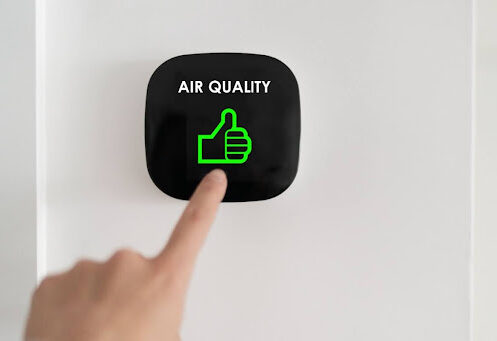There are countless moments in our day that we don’t give a second thought. Flipping on a light switch, pouring a glass of water, or taking a deep breath in our living room. It’s only when something feels off that we start to question these routines. Maybe it’s a lingering cough, a mysterious odor, or just a general sense of discomfort. We ask ourselves, “What’s causing this?” However, we often come up empty-handed.
The truth is, most of us don’t think much about indoor air quality until there’s a reason to. Yet, the air inside our homes plays a major role in how we feel every day — from energy levels and focus to long-term health. If you’ve been feeling “off” lately or just want to make sure your family is breathing clean air, indoor air quality testing is a smart step.
Let’s break down what indoor air quality tests measure and how to take action if something’s not quite right.
What Are Indoor Air Quality Tests?
Indoor air quality tests are designed to give you a clearer picture of what’s floating around in your home’s air. These tests don’t just tell you if there’s a problem — they help pinpoint the problem.
You might be surprised at what’s detectable: microscopic particles, gases, humidity levels, even biological contaminants like mold. All of these can impact your health in different ways.
Let’s dig into the specifics of what indoor air quality tests measure.
Common Pollutants Detected
So, what do indoor air quality tests measure? These kinds of tests often focus on identifying several key pollutants:
- Particulate Matter (PM2.5 and PM10): These tiny particles, including dust, pollen, and smoke, can penetrate deep into the lungs and even enter the bloodstream.
- Volatile Organic Compounds (VOCs): Emitted by products like paints, cleaning supplies, and air fresheners, VOCs can cause headaches, dizziness, and long-term health issues.
- Carbon Monoxide (CO): This odorless, colorless gas can be deadly at high levels and is often produced by malfunctioning fuel-burning appliances.
- Radon: A naturally occurring radioactive gas that can seep into homes from the soil, radon is a leading cause of lung cancer among non-smokers.
- Mold and Mildew: High humidity and water leaks can lead to mold growth, which releases spores that may cause allergic reactions and respiratory problems.
- Formaldehyde: Found in building materials and household products, formaldehyde exposure can lead to irritation of the skin, eyes, nose, and throat.
Health Implications of Poor Indoor Air Quality
Poor indoor air quality can have a range of health effects, particularly for children, the elderly, and those with preexisting health conditions. Symptoms can include headaches, fatigue, shortness of breath, and irritation of the eyes, nose, or throat. Long-term exposure to certain pollutants can potentially lead to more serious conditions like asthma, heart disease, and cancer.
Why Professional Testing Matters
While DIY air quality test kits are available, professional testing offers a more comprehensive analysis. Experts use specialized equipment to detect a wide range of pollutants and can provide recommendations tailored to your home’s specific needs. Professional testing can also identify issues that DIY kits might miss, such as hidden mold or complex chemical pollutants.
When Should You Test Your Indoor Air?
There’s no bad time to take a closer look at your home’s air quality, but here are a few moments when it makes even more sense:
- After a renovation or construction project
- If your family is experiencing unexplained health symptoms like fatigue, coughing, or headaches
- Before moving into a new home
- If you live with elderly family members, kids, or anyone with asthma or allergies
- If your home has a musty smell, signs of mold, or moisture issues
Testing gives you a solid starting point and peace of mind, especially once you know exactly what indoor air quality tests measure and how they can help you make your home healthier.
How to Improve Your Indoor Air Quality
Once you’ve had a test done and know what you’re dealing with, it’s time to start making changes. You don’t have to do everything at once, but even small improvements can make a big difference in how your home feels — and how your family feels, too.
Get Serious About Filtration
Upgrading your air filter or adding a whole-house air filtration system is one of the most effective ways to clean your indoor air. These systems work with your existing HVAC setup and are designed to catch the really fine stuff that a regular filter might miss, like smoke particles or pollen.
Use Air Purifiers in Key Areas
A portable air purifier in bedrooms or common areas can help tackle lingering pollutants and allergens. Look for models with HEPA filters and activated carbon for best results.
Stay on Top of HVAC Maintenance
Dirty ducts and clogged filters only make problems worse. Scheduling regular maintenance or even a professional Boca Raton AC repair with Erica’s Plumbing, Air Conditioning & Restoration can help keep airflow strong and pollutant levels down.
Why Air Quality Testing Matters
So, what do indoor air quality tests measure? They check for pollutants like dust, mold, volatile organic compounds, carbon monoxide, radon, and even high humidity levels that can affect both your health and comfort. These tests help uncover hidden issues in your home’s air that could be triggering allergies, headaches, or fatigue — things that often go unnoticed until they become a bigger problem.
By understanding what indoor air quality tests measure, you’re better equipped to take meaningful action.
Enhance Your Home’s Air Quality in Boca Raton, FL, Today!
If you’re in South Florida and want a professional assessment, Erica’s Plumbing, Air Conditioning & Restoration offers trusted indoor air quality services in Boca Raton, FL. Our team can help you identify pollutants and recommend real solutions — like installing a whole-house air filtration system or addressing issues with ventilation and humidity.
So if you’ve been wondering what’s in the air you breathe or dealing with unexplained symptoms like headaches, shortness of breath, or fatigue, don’t ignore the signs. Your home should be a place where your family can truly relax and breathe easy.
Give us a call today to schedule an appointment in Boca Raton, FL, or one of the nearby areas in Palm Beach and Broward counties! You might not see what’s in the air, but you’ll definitely feel the difference once it’s cleaner.

